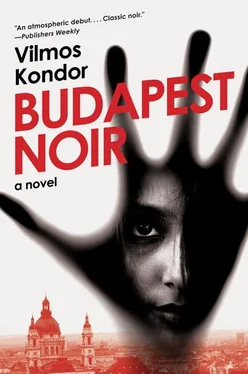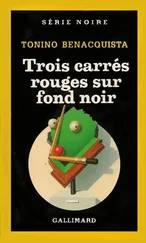“And that’s when you saw how much money was inside?”
“Yep.”
“And that’s when you socked her in the stomach.”
“Yep.”
“After seeing how much money she had with her.”
Pojva nodded.
“And what else did she have in her purse?”
“Just the money, plus a bunch of junk. I gave that stuff to my little woman and the kids.”
“But you left a book inside,” said Gordon.
“Some sort of book,” said Pojva. “I figured as long as she’s dead, they might as well bury her with that. Besides, we don’t read.”
“And you don’t pray.”
“Who am I supposed to pray to?” asked Pojva, staring at an odd-shaped heap of straw in the corner of the room that had once been a piece of furniture but whose cover had long since shredded away.
Gordon followed his eyes, then slowly nodded. He turned to leave, but then called back. “Do a good job tonight, huh?”
“I will. It’s my specialty, after all,” he said, drinking down what remained in the bottle.
Outside, it was starting to rain. Gordon looked inside the pigpen. There he saw not pigs but Pojva’s wife and the two kids. They were cowering in the mud; there was no straw inside, and the cold wind was blowing in through gaps in the walls and the roof. The kids were so used to it that they weren’t even shivering. Gordon leaned inside the pigpen and reached out the money toward the woman. But she only shook her head, her eyes filled with terror.
“Take it already, goddamnit!” bellowed Pojva from the door of the shanty. “And buy some food, too, you hear?!”
The woman took the money. Gordon looked at the two children. “Are your parents still alive?”
“They’re down on the plains,” the woman half whispered with a nod. “If I ever get free of this”—she shook her head toward Pojva—“I’d go back there right away with the kids.”
“Take good care of the money,” said Gordon. “It might yet help get you a train ticket.”
Gordon walked back out to the muddy road, turned up his collar, and headed in the direction of Üllői Street. While waiting for the tram, he looked at his watch. It was just past four. He would get to Gubacsi Road sooner than he’d planned. When the tram reached the corner of Könyves Kálmán Boulevard, he got off and entered a tobacconist’s shop.
“May I use the phone?” he asked, putting a twenty-fillér coin on the counter.
Opening up his notebook, Gordon looked up the number of the maternity home, then dialed. The central switchboard transferred him to the director’s line. His secretary answered.
“The director has already left for the day.”
“My name is Zsigmond Gordon. I’m a journalist for the Evening , and I’m writing an article about the state of affairs at maternity homes. Has the public been in a giving mood lately?”
“Giving?” came the woman’s confused reply.
“Are you getting donations?”
“Once in a blue moon.”
“You haven’t gotten a sizable sum lately?”
“If we had, we’d be heating the bathrooms, too, not just the wards and the operating room.”
“So you haven’t received any big donation.”
“Unless you yourself are planning to help us out,” said the woman in a joking tone of voice.
“I’m planning on it,” Gordon replied. “I am.”
After stepping out of the tobacconist’s shop, Gordon boarded the tram for a short ride along Könyves Kálmán Boulevard. He got off at Mester Street and walked a block toward the Danube to Gubacsi Road. The last workers were straggling home from the oil refinery. The massive iron gate of the factory building beside it was closed, but Gordon noticed that men in groups of two or three began arriving regularly at its side entrance. He drew into the doorway of the building opposite and for a while looked quietly on. Before long, five middle-aged men arrived in the company of a much younger man who looked more like a kid. He proceeded with slow, plodding steps, but his jacket almost burst on his back. One of the shorter men in the group hurried over to the side entrance and went inside. Less than a minute later he gestured for the others to follow him in.
When another group arrived, Gordon hastened over to the other side of the street and stepped up behind them. The man leading the way opened the side gate and waved a hand at the caretaker’s booth. Now inside the grounds, Gordon separated from the group for a look around. But he saw nothing special; nor could he determine exactly what sort of factory this was. Most probably it housed several smaller operations—judging from the smells, a cabinetmaking facility and a furrier, at the very least. Gordon hurried to catch up with the group. They had turned left into an alleyway of sorts, stopping to open a heavy iron door. Gordon waited for the door to slowly close behind him. The group was now well ahead of him, having walked down what seemed to be a pitch-black, narrow hallway. Since Gordon couldn’t see a thing, he edged his way forward, following sounds. Another door opened, then slammed shut. He moved in its direction. Finally, Gordon found the door, on the right side of the hallway, and opened it. He now stood outside or, rather, in the building’s inner courtyard. In fact, he’d gotten there just in time to catch a glimpse of one of the men vanishing from the courtyard into a doorway that, from what he could make out, led down to the cellar. Gordon’s footsteps echoed off the cobblestone courtyard. The barred windows of the five-story building loomed darkly above on all sides.
Gordon opened the cellar door. The smell of sweat struck his nose at once and he heard laughter. Unbuttoning his jacket, Gordon headed down the stairs. At the bottom stood a weasel-faced old codger with a shifty gaze. Gordon took a pengő from his pocket and pressed it into the man’s palm. The man stood aside.
Gordon was surprised by the cellar’s colossal size. Never would he have imagined that such a large space existed under this building. In the middle was a boxing ring surrounded by a throng of men with their coats flung over their shoulders. In one corner a young boy was tapping beer from a keg. Spotting the bookies in the crowd wasn’t hard. With slips of paper in one hand and thick clumps of banknotes in the other, each of them kept stridently announcing the ever-changing odds by the minute. Just how they went about calculating was a mystery to Gordon. Pushing his hat up over his forehead, he stepped into a corner, lit a cigarette, and stood there watching. An iron door occupied each corner of the cellar. It took Gordon only a couple of minutes to understand that at least three of these doors were locked. But the fourth soon opened, and out came a boy of around fourteen carrying a bucket of water. The door closed behind the boy, but Gordon walked over and opened it again. He found himself in a hallway occupied by several small groups of men. A scruffy man with thick eyebrows stepped up to Gordon.
“Where to? Let’s have it.”
“Antal Kocsis said this is where I could find Jacek,” Gordon replied.
“You know Kocsis?”
“Didn’t I just say so?”
“And what do you want with Jacek?”
“What business is it of yours?”
“Everything here is my business,” said the man, crossing his arms over his chest.
“I’m here to offer him work.”
“What kind of work? And, anyway, who the hell are you?”
“A little work on the side,” said Gordon, pushing the man out of the way.
“I don’t buy that,” said the man, seizing Gordon’s right arm. The others had meanwhile gone back into the main part of the cellar, leaving Gordon and the man alone in the hallway.
“Let go of my arm.”
“You haven’t told me yet who you are,” hissed the man. “But you don’t have to. I’ll drag it out of you.” Only when Gordon turned toward him did he loosen his grip on Gordon’s arm. Gordon now came so close to the man that their faces were almost touching. “You’ll drag it out of me, will you?” he asked.
Читать дальше
Конец ознакомительного отрывка
Купить книгу












